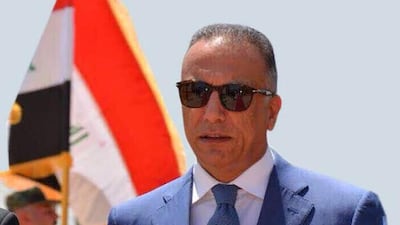The UN called on Tuesday for the dismantling of armed groups in Iraq, as the country faces an acute political and social crisis.
The country has been mired in a power vacuum months after Prime Minister Adel Abdul Mahdi was pushed out by nationwide anti-government protests, which have left 500 people dead and injured around 15,000.
The government has blamed "unknown" armed groups for their deaths. Although authorities have pledged to prosecute those responsible, it has not announced any charges.
“The large number of armed groups that are operating outside of state control are preventing the country from functioning, they must be dismantled,” Jeanine Hennis-Plasschaert, Special Representative of the UN Secretary General for Iraq, told the Security Council.
The responsibility for “peoples’ safety and security undeniably rests with the state," she said.
Anti-government demonstrators have called for an end to foreign interference mainly from Iran and the United States.
"It should be clear that peaceful protesters, backed by a silent majority, will not budge on their aspirations," Ms Hennis-Plasschaert said.
Full systemic reform will be necessary for changes to occur in the country, she said.
"No one understands this better than the Iraqi women and men whose chances of a more prosperous life continue to be undermined by a system which ignores them, or worse, actively works against them," Ms Hennis-Plasschaert said.
Baghdad "must move from constant crisis management to sustainable and stable politics, building resilience through deep and broad systemic reform," she said.
"As we all know: strength at home is a prerequisite for strength abroad," she said.
The development comes as an Iranian-backed Iraqi militia warned on Tuesday to unleash a war if intelligence head Mustafa Al Kadhimi becomes prime minister.
Iraq still does not have a prime minister and various names, such as Mr Al Kadhimi, have been circulating in political circles about who could take the position.
Kataib Hezbollah, a designated terror group by the US, said Mr Al Kadhimi's appointment would amount to a “declaration of war".
“He is one of those accused of helping the American enemy" assassinate top Iranian general Qassem Suleimani and Iraqi paramilitary commander Abu Mahdi Al Muhandis, who helped found Kataib Hezbollah, spokesman Abu Ali Al Askari said on Twitter.
The two officials died in a US drone attack near Baghdad's airport two months ago.
"He will demolish what is left of the country's security," Mr Al Askari said.
Mr Al Kadhimi has been rumored to be a prime ministerial contender since December.
He has kept a low profile since taking office at the National Intelligence Service in June 2016 and is known to have good relations with the US and regional powers.
The spokesperson for the Iranian-backed militia said the group prefers to have Mr Abdul Mahdi in office.
The country is facing a political deadlock after Prime Minister-designate Mohammed Allawi withdrew his candidacy on Sunday after he accused political parties of obstructing his efforts.
The move was unprecedented for Iraq which has never had a prime minister designate fail to secure parliamentary backing for a cabinet line-up.
"Delivering on the demands of the people will require a collective effort. I again emphasise that no prime minister can go it alone," Ms Hennis-Plasschaert said.
She held all political actors and leaders "responsible for restoring the critical confidence of the public in their government and its institutions."
President Barham Salih is now charge as acting premier and will have to nominate a new candidate within the next 15 days, according to the constitution.
The UK ambassador to the UN, Karen Pierce, urged Iraqi officials to "put national interests first and work together constructively to support a new prime minister."
"Iraq urgently needs an inclusive and representative government committed and able to deliver on the demands of the Iraqi people," Ms Pierce said in an address to the Security Council.
Repression of protesters must end and be investigated, she said.
On Sunday, the militia group gave Iraqi political parties, citizens and businesses 15 days to halt all dealings with American forces.
“We are sending a final and irreversible warning to Iraq’s transport and security companies to annul their contracts with US troops," Mr Al Askari said on Twitter.
He also called on Iraqis working in the government to “abstain from meeting with the leaders of the American enemy.”
The spokesman also urged members of the Popular Mobilisation Forces, also known as the Hashd Al Shaabi, and other Iranian-backed militia groups to “support this directive with everything in their ability”.
Shortly after the killing of Suleimani and Abu Mahdi Al Muhandis, the militia group warned it would conduct suicide operations against US troops.


